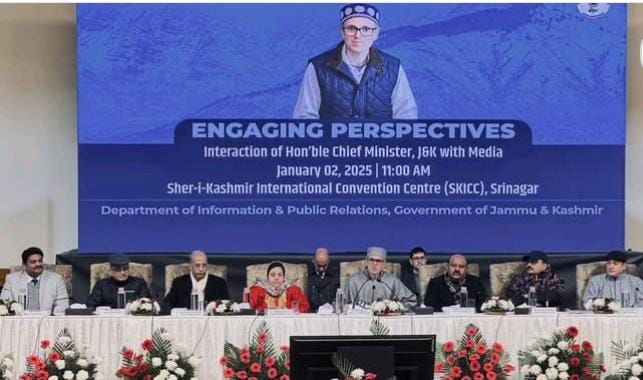By Agencies
Srinagar, Jan 2: Jammu and Kashmir Chief Minister Omar Abdullah today addressed a press conference at the Sher-i-Kashmir International Conference Centre (SKICC) in Srinagar. In a detailed interaction, he spoke on a variety of pressing issues, ranging from governance and policy initiatives to cultural inclusivity and the region’s political challenges.
Opening the session, Abdullah emphasized his commitment to fostering open communication with the press and the public. He expressed a desire to make such interactions a regular practice during his term, stating, “I hope twice a year we can have these interactions without any artificial boundaries. I aim to be more open and accessible to you in this term.”
The Chief Minister also touched upon the significance of respecting cultural diversity, citing his recent attire choices. “I wear a Sozni cap because it is part of my heritage. Similarly, I wore a Pagdi in Jammu out of respect for all cultures. These gestures do not weaken my faith; instead, they demonstrate my regard for our shared traditions,” he remarked.
Addressing governance priorities, Abdullah announced that the government is formulating a comprehensive policy for expired leases, particularly those involving Gulmarg and Pahalgam hoteliers, and for Roshni scheme landholders. This, he explained, is part of broader efforts to ensure fairness and clarity in land policies. He also shared ongoing work to refine business rules, ensuring that any ambiguities in governance are addressed with input from legal experts before being presented to the Lieutenant Governor.
On the contentious issue of reservations, Abdullah affirmed that a sub-committee had been formed to address the matter, though he underscored that decisions by the High Court, and eventually the Supreme Court, would ultimately guide the process. He called for unity and focus on protecting land and job rights for the people of Jammu and Kashmir, rather than being distracted by internal disputes.
The Chief Minister also commented on a recent protest led by National Conference leader Ruhullah Mehdi. Welcoming the democratic spirit of such actions, he said, “The National Conference is a democratic party, and everyone has a right to voice their opinions. Today, protesters reached the Chief Minister’s office and later met me, which was unthinkable in the past. This reflects the progress we have made in allowing space for dialogue.”
In discussing broader political issues, Abdullah questioned the narrative of a resolved Kashmir conflict. “Even if we were to say the Kashmir issue has been resolved, what about the part across the LoC? Is that resolved too? The issue remains,” he noted, highlighting the complexities of the situation.
Reflecting on his government’s manifesto, Abdullah reiterated his administration’s commitment to delivering on key promises, including resolutions for statehood, special status, and constitutional guarantees. While acknowledging the need for adherence to specific timelines, he assured that significant progress would be shared in a detailed report card after the first 100 days of governance.
Finally, Abdullah addressed the legacy of Sheikh Abdullah and the martyrs of July 13, emphasizing that their contributions do not require a designated holiday for remembrance. “Almost everything we do is a reflection of their legacy,” he said.
As the Parliament session approaches, Abdullah expressed hope that political leaders would rally together to push for the restoration of Jammu and Kashmir’s statehood, underscoring the importance of collective action in addressing the region’s aspirations.
The press conference presented a detailed account of the Chief Minister’s vision and priorities, reinforcing his administration’s focus on transparency, inclusivity, and addressing the core challenges facing Jammu and Kashmir. (CNS)
